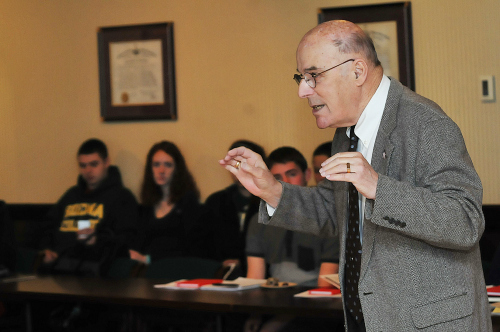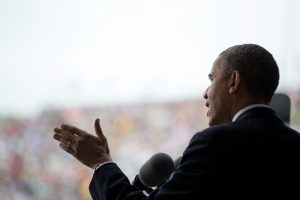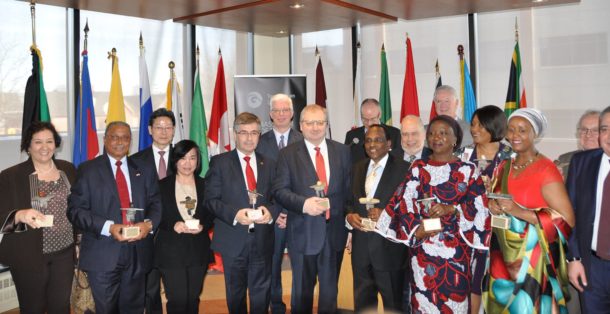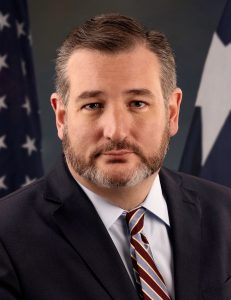By Ambassador Robert Gosende* Image from, under the headline: Ambassador Robert Gosende Speaks at Siena Symposium
Image from, under the headline: Ambassador Robert Gosende Speaks at Siena Symposium
I recently had the opportunity to be in Russia, Moscow and St. Petersburg, for one week participating in the 7th Annual St. Petersburg Cultural Forum. I was invited to participate in the Forum by the Dance and Ballet section which asked me to describe the importance that I attached to the decision by the U.S. and U.S.S.R. governments to support contact in the Arts during the Cold War. I was happy to do this since I participated in such activities during my career as a diplomat in the U.S. Information Agency [JB – see].
This unexpected return to Russia brought my wife and me back after a long hiatus. Much has changed since we last were assigned there 20 years ago. Moscow and St. Petersburg, each always very beautiful cities, have been completely restored. The city-center streets are in perfect shape. Buildings are once again beautiful and great skill has been exercised, especially in Moscow to make intelligent choices as redevelopment has occurred.
The central Moscow site of what had been the biggest hotel in the world, the Rossiya, has now been developed as a magnificent park in the city center. This is the site that Donald Trump sought for many years to purchase so that he could build the tallest building in Europe atop which, we recently learned, he hoped to build a $50 million penthouse for Vladimir Putin. But Trump’s attempts to purchase land anywhere in Moscow were rebuffed. An architecturally important neighborhood of old Moscow was torn down when the Soviets decided to build the Rossiya. The new park replacing the Rossiya provides green space right in the heart of Moscow with new cultural facilities underground that have become a drawing point for city dwellers to find fresh air and a magnificent new arts center.
It appears that no ruble has been spared to redevelop Moscow and St. Petersburg. Russia is a wealthy country. It continues to strip resources, oil, coal, gold, timber to fund its national budget. It is led by a person who seems to care not a whit about whether the Russian economy is sustainable over the long term but rather what it looks like and how it acts within the short term of his lifetime.
In the course of preparing for this presentation in St. Petersburg I looked at the statements and attitudes of Russian and American leaders during the Cold War to try to discern what leaders were doing and saying about educational and cultural contacts. In 1953, writing to Theodore Streibert, the newly appointed first Director of the new U.S. Information Agency, President Dwight Eisenhower wrote, “We should bring 10,000 Soviet students to our country each year without any demand for reciprocity." And during this Cold War period we saw Eisenhower and Khrushchev meeting in Europe and then Khrushchev visiting the US for 13 days in 1959 and then again in the US in 1960. Eisenhower had been scheduled to visit the USSR in 1960 but that visit was cancelled by Khrushchev following the U-2 incident. But it is very clear that President Eisenhower, the creator of U.S. People to People Programs, and Khrushchev were attempting to work together during this period though there certainly were ups and downs.
Leaders now are certainly not urging greater contacts among people. In Russia today we see state owned or controlled media, TV, newspapers, radio, and social media, operating full blast to produce the most virulent anti-American propaganda imaginable. This is not only true of Russia Today, Russia’s state-owned English language propaganda organization, but even more intensely focused in Russian language media. Under Putin’s leadership the Russian state has cut Russia off from the rest of the world, most especially the U.S. and Western Europe. Youth exchange programs between the US and Russia were shut down three years ago by the Russian side with the story being told in Russia that the U.S. Government propagandized the young Russian participants while they lived with American families across our country so that when they returned the young Russian participants had come to hate their country.
However Russian President Putin has much more in mind than cutting Russians off from the outside world. He is obsessed with what has long occupied Russian leaders: the thought of opposing military forces gaining access to Russia via the states along its borders. And in no instance is this more of a concern to him than Ukraine. Russians have a difficult time imagining Ukraine as not being an integral part of Russia. Russia first appeared on the map some 1000 years ago in Kiev, the capital of Ukraine, and at a small northwest Russian city called Novgorod. Over the centuries there has been extensive intermarriage between Russians and Ukrainians. Many Russians have Ukrainian names and vice-versa. There were no closer relationships during the Soviet era than those between Russians and Ukrainians. When Soviet Premier Nikita Khrushchev “gave” Ukraine to the Ukrainian Soviet Socialist Republic in 1954 he was seeking to curry favor with the First Secretary of the Ukrainian Communist Party for support on issues he was promulgating within the U.S.S.R. Presidium. And this act was essentially meaningless since Ukraine was then a fully-integrated part of the Union of Soviet Socialist Republics (USSR). There was no meaningful border between Crimea and Ukraine and Russia.
Putin’s comments on the collapse of the USSR along the lines that it was one of the great tragedies of the 20th century, might lead one to believe that he would like to recreate the U.S.S.R. However is not true. He certainly does not want to once again take fiscal responsibility for the former states of the U.S.S.R. But he can be expected to continue to press Russia’s key Border States for military access if not control. This is especially true in the case of Ukraine as we saw with the annexation of Crimea and as we now see with his attempt to restrict Ukraine’s access from its ports along its coast with the Sea of Azov through the Kerch Strait into the Black Sea. Since the Crimean annexation, Russia has built a long highway and bridge across the Kerch Strait. It recently anchored an oil tanker under this new bridge effectively blockading the Kerch Strait and then proceeded to seize three Ukrainian ships and their crews as they approached the strait in what can only be characterized as acts of open hostility if not war.
So is Putin’s aim here is to extend Russian control over the Sea of Azov? There needs to be urgent discussion now between NATO and Russia about this clear violation of international law which should also address Russian security concerns. In his resignation letter Secretary of Defense Mattis said, “we must be resolute and unambiguous in our approach to those countries whose strategic interests are increasingly in tension with ours. It is clear that China and Russia want to shape a world consistent with their authoritarian model to promote their own interests at the expense of their neighbors.” But how far away are we now from seeing our President express this clearly and unambiguously?
Russia is the most challenging foreign policy problem currently at hand for US policymakers and for the immediate future of international security.
***
*Ambassador Robert Gosende is a retired Senior Foreign Service Officer from the U.S. Information Agency. His Foreign Service specialization was Educational and Cultural Affairs though as a generalist officer he served as President Clinton’s Special Envoy for Somalia at the height of the humanitarian crisis there in 1992-93 and as the Officer in Charge of election assistance to South Africa during the run-up to the 1994 elections that brought Nelson Mandela to office. During their 36-years of service, he and his wife worked abroad in Uganda, Libya, Somalia (twice), South Africa (three times), Poland and the Russian Federation, as well as in Washington, D.C., where Mr. Gosende was assigned as Deputy Associate Director of the Bureau of Educational and Cultural Affairs and as Area Director for sub-Saharan Africa. In retirement Mr. Gosende served for twelve years as the Senior International Officer for the sixty-four campus State University of New York.
Original Article
Public diplomacy John Brown's Public Diplomacy Press and Blog Review Russia Today: Our Most Urgent Foreign Policy Challenge (December 22, 2018)







